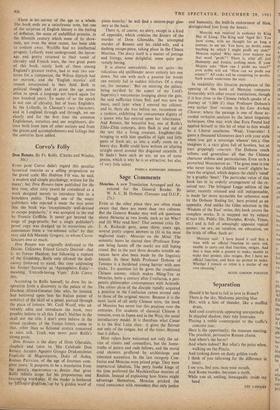Sage Comments
Mencius. A new Translation Arranged and An- notated for the General Reader. By W. A. C. H. Dobson. (Toronto and O.U.P., 25s.)
EVEN at the other place they. are often made aware that there are more than two cultures. But the General Reader may well ask questions about Mencius at two levels, such as (a) Who? and (b) Why read him? That seminal critic Dr. I. A. Richards gave, some thirty years ago, several pretty cogent answers to (b) in his most neglected study: Mencius on the Mind. The semantic hares he started then (Professor Emp- son being fastest off the mark) are still loping round. But in the past three decades notable ad- vances have also been made by the linguistic hounds. In these fields Professor Dobson of Toronto is a hardened young harrier with new tricks. To question (a) he gives the traditional Chinese answer, which makes Meng-Tzu or Mencius, born a century after Confucius, a peri- patetic philosopher contemporary with Aristotle. The obiter dicta of the disciple rapidly acquired a position in the Confucian canon second only to those of the original master. Because it is the most lucid of all early Chinese texts, the book of Mencius has never lost this position over the centuries. For students of classical Chinese it remains, even in Japan and in the West, the usual introductory model. It is therefore what_Cmsar is to the first Latin class: it gives the flavour not only of the tongue, but of the times. Beyond that it differs.
Most rulers have welcomed not only the ad- vice of viziers and counsellors, but the home- truths of jesters and rude fellows, and the moral cold showers proffered by archbishops and tolerated eccentrics. In the last category Con- fucius and Mencius were prized prigs. They were impractical Idealists. The petty feudal kings of the time preferred the Machiavellian maxims of Realists. Instead of explaining how States might advantage themselves, Mencius pricked the royal conscience with reminders that only justice and humanity, the built-in endowment of Man, distinguished him from the beasts:
Mencius was received in audience by King Hui of Liang. The King said 'Aged Sir! You have come, with no thought for so long a journey, to see me. You have, no doubt, some teaching by which- I might profit my state?' Mencius replied 'Why must your majesty use that word "profit"? There is, after .all, just Humanity and Justice, nothing more. If your Majesty asks "How can I profit my state?" your noble will ask "How can we profit our estates?" All ranks will be competing for profits. Such would undermine the state.
In readability this lineatim paraphrase of the opening of the book of Mencius compares favourably with other extant translations, though it is less close to the Chinese (which speaks of a journey of '1,000 li') than Professor Dobson's own earlier 'free' version in his Late Archaic Chinese, where the passage is one of those ac- corded verbatim analysis by the latest linguistic techniques. One may wish that Ezra Pound had applied himself to this bit of what to him would be a Liberal anathema. 'Waal, Venerable! I guess a thousand kilometres don't crib your style when you got a sovereign wheeze' (etc.). One imagines it, a racy gloss full of howlers, but at least grippingly concrete. The Dobson touch softens and generalises all that the Chinese character defines and particularises. Even such a proverbial Mencianism as: 'The great man is one who never loses his childlike touch' slightly be- trays the original, which depicts the child's 'mind' by a graphic 'heart.' The particular value of this book lies in its orderly arrangement of the re- ceived text. The bilingual Legge edition of the latter, recently reissued and still indispensable, is made far more accessible for reference now by the Dobson 'finding list,' here printed as an appendix. And unlike the Giles selection in the `Wisdom of the East' series, this book covers the complete works. It is mapped out by subject (Court life, Public life, Disciples, Rivals, Times, etc.) and is full of amusingly apposite topical quotes: on sex, on taxation, on education, on the trials of office. Such as:
Mencius said : '1 have heard it said that a
man with an official •'function to carry out, unable to carry out that function, resigns. And that a man with a protest to make, unable to make that protest, also resigns. But I have, no official function, and have no protest to make. Whether I remain or retire is a matter of my own choosing.'
HUGH GORDON PORTEUS






























 Previous page
Previous page